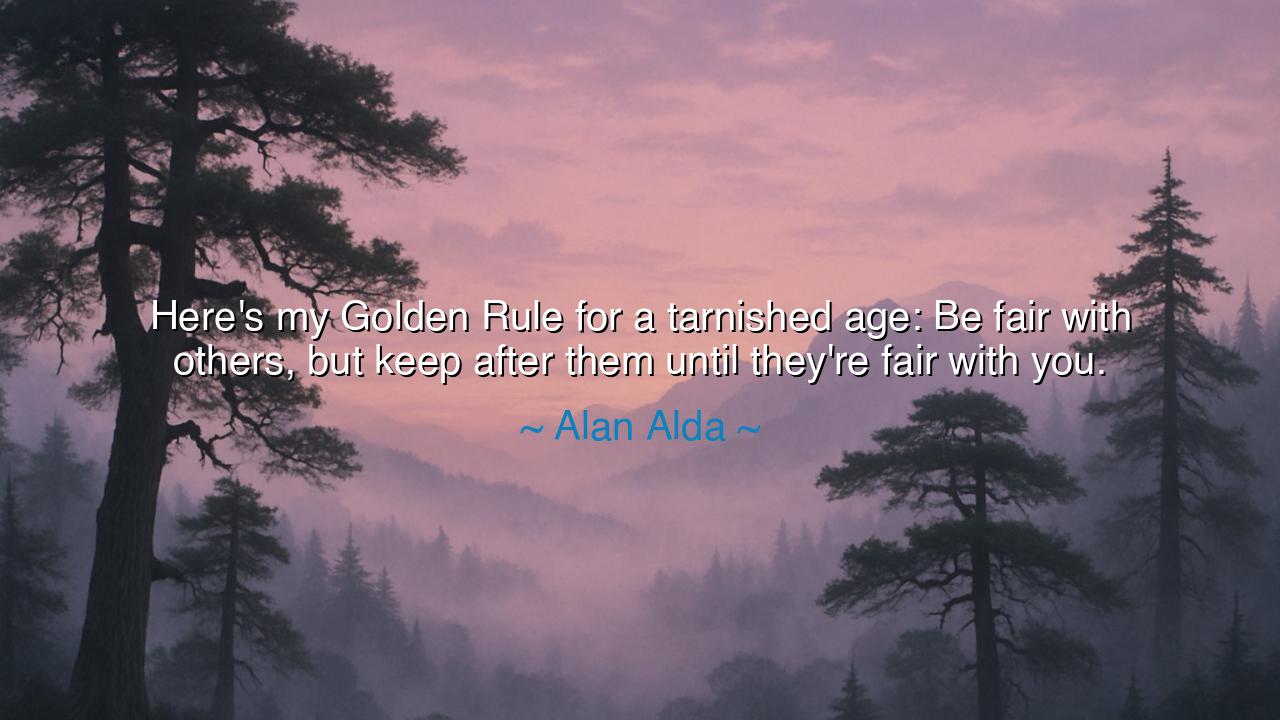
Here's my Golden Rule for a tarnished age: Be fair with others
Here's my Golden Rule for a tarnished age: Be fair with others, but keep after them until they're fair with you.






"Here's my Golden Rule for a tarnished age: Be fair with others, but keep after them until they're fair with you." These words, spoken by the wise Alan Alda, encapsulate a deeply rooted principle in the human experience: the delicate balance between fairness and assertiveness. In a world that is often marked by inequality, corruption, and conflict, Alda’s golden rule provides a call to action—not just to act with justice but to demand it when it is withheld. His message is clear: fairness is a value we should strive to uphold in our dealings with others, but when that fairness is not returned, we must be persistent in holding others to the same standard.
In ancient times, such notions of fairness and justice were cherished by the great thinkers and rulers. The Greek philosophers, such as Socrates, believed deeply in the power of justice and the importance of ensuring that society functioned on the principles of fairness. Plato, in his Republic, emphasized that the ideal state must be built upon the idea of justice—where each person plays their role according to their abilities and virtue. However, Plato also recognized that human nature often falls short of this ideal. Much like Alda’s golden rule, Plato’s writings remind us that fairness is not always guaranteed, and sometimes one must demand it from others in order to bring about the just society.
The Romans, too, had a keen sense of justice. Cicero, one of the greatest orators and philosophers of Rome, spoke frequently about the idea of fairness in both personal conduct and public service. Cicero understood that the good life was impossible without equitable treatment, and that one must uphold these ideals even when others may not. His writings suggested that a person’s integrity must not waver in the face of injustice, for true virtue lies in the steadfast pursuit of what is right. Alda, in his golden rule, follows in this tradition—insisting not only on being fair but on persevering in demanding fairness from others, a call to both personal and social responsibility.
Consider the example of Gandhi, whose pursuit of fairness and justice led him to challenge the British Empire. Gandhi’s philosophy of nonviolent resistance was rooted in a belief in fairness and equality for all, but he did not simply call for fairness passively. He actively fought for it, leading millions in the struggle for independence, and holding the British accountable to the moral principles they claimed to uphold. Gandhi's persistence in the face of injustice, his ability to stay after his adversaries until they were fair with him, became one of the most powerful movements in modern history. Like Alda’s rule, it was not enough for Gandhi to ask for fairness; he demanded it, unwaveringly, until the world had no choice but to recognize it.
The principle embedded in Alda’s golden rule is not one of aggression, but of persistence and integrity. There is an ancient wisdom in the idea that while one should always act justly toward others, one should not shy away from demanding justice in return. This persistence is not born out of self-interest, but rather out of a commitment to the greater good. It speaks to the inner strength required to stand up to unfairness, whether in the personal realm or on a larger societal scale. It echoes the story of Cyrus the Great, who founded the Persian Empire and is known for his benevolent rule, but also for his insistence on fairness in governance. When he encountered injustice, he was relentless in his pursuit of correcting it, ensuring that his subjects were treated with equity and respect.
The lesson we must learn from Alda's words is that fairness is not a passive virtue—it requires action, courage, and tenacity. In a world where the tides of power and influence often leave the vulnerable behind, we must be both generous in our fairness to others and uncompromising when it is withheld from us. Fairness is not just a noble ideal but a force that must be fought for, especially when others seek to undermine it. Alda’s golden rule calls on us to act justly, but also to be vigilant in holding others to the same standard.
Practical action requires that we, as individuals, become both exemplars of fairness and champions for it. We must, in our daily lives, not only treat others with fairness but demand that fairness is reciprocated. In situations where we face injustice, we should not retreat but continue, with dignity and persistence, to stand for what is right. Like Cicero, Gandhi, and Plato, we must be unyielding in our pursuit of fairness, knowing that it is not simply a personal good, but a collective necessity for the flourishing of society.
Thus, let us carry Alda’s golden rule as a guide in all our dealings—whether in personal relationships, work, or society at large. In a world that may often seem to favor the unjust, let us remain committed to fairness, not just in our hearts but in our actions. Let us, too, be relentless in our pursuit of justice, knowing that fairness—like all noble ideals—must be fought for and defended. It is in this pursuit that we create the world we wish to live in, a world built on the foundation of fairness, integrity, and mutual respect.






AAdministratorAdministrator
Welcome, honored guests. Please leave a comment, we will respond soon